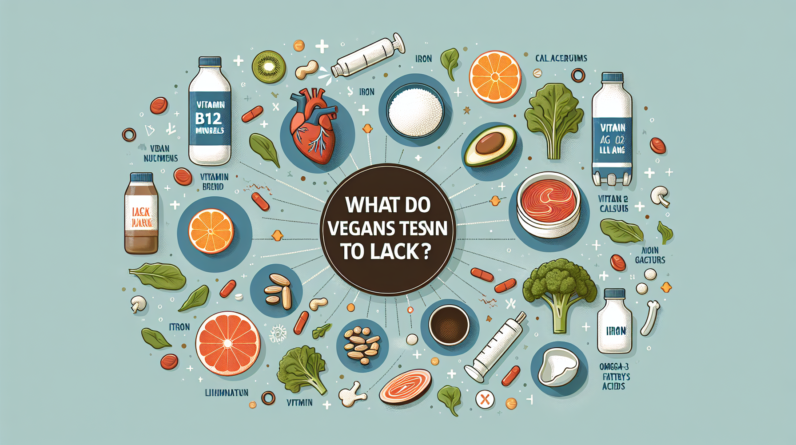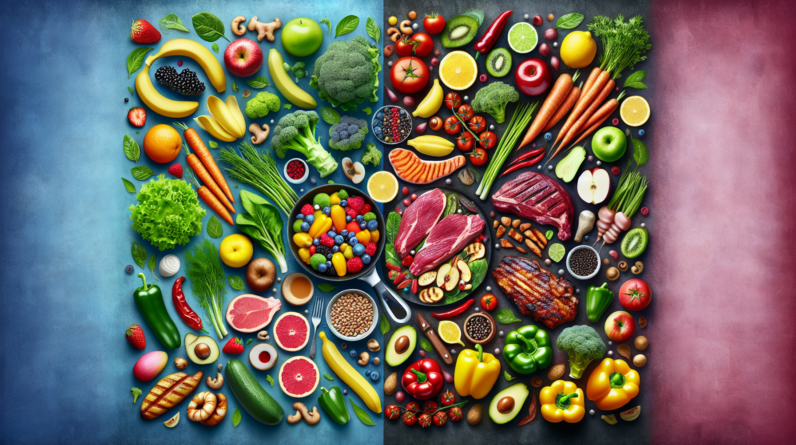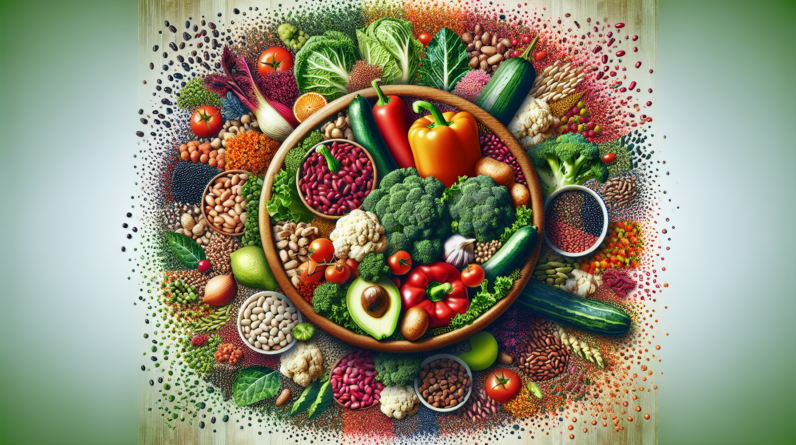Are you curious about the health benefits of a plant-based diet? In this article, we will explore the question of whether it is healthier to be a vegetarian or a vegan. Both lifestyles have gained popularity in recent years, but what are the differences? We will examine the nutritional aspects, potential health risks, and the potential environmental impact of both diets. Whether you are considering making a dietary change or simply interested in learning more, join us as we delve into the world of plant-based eating and its impact on our health.
Table of Contents
Nutritional Benefits of Vegetarianism
Introduction to Vegetarianism
Vegetarianism is a dietary choice that excludes the consumption of meat, fish, and poultry. It is a lifestyle that emphasizes plant-based foods such as fruits, vegetables, legumes, grains, nuts, and seeds. Many people choose to follow a vegetarian diet for various reasons, including ethical, environmental, and health considerations. In this article, we will explore the nutritional benefits of vegetarianism and how it can contribute to a well-balanced and healthy lifestyle.
Essential Nutrients in Vegetarian Diet
One common concern people have about vegetarianism is whether it can provide all the essential nutrients required for optimal health. Fortunately, a well-planned vegetarian diet can fulfill all the necessary nutrients. Vegetarian diets are typically rich in fiber, antioxidants, vitamins, and minerals. By incorporating a variety of plant-based foods into your meals, you can ensure an adequate intake of essential nutrients such as carbohydrates, proteins, fats, vitamins, and minerals.
Benefits of a Well-Balanced Vegetarian Diet
A well-balanced vegetarian diet offers numerous health benefits. Firstly, it tends to be lower in saturated fats and cholesterol, which can contribute to improved heart health and a reduced risk of cardiovascular diseases. Secondly, a vegetarian diet that includes a variety of fruits, vegetables, whole grains, and legumes is abundant in dietary fiber, which promotes healthy digestion and helps prevent constipation. Additionally, a vegetarian diet is typically higher in antioxidants, which play a crucial role in combating oxidative stress and reducing the risk of chronic diseases such as cancer and diabetes.
Potential Health Concerns of Vegetarianism
Common Nutrient Deficiencies in Vegetarian Diet
While vegetarianism can provide many health benefits, it is important to be mindful of potential nutrient deficiencies that may arise if not properly planned. Some common nutrients that individuals following a vegetarian diet may need to pay attention to include iron, vitamin B12, omega-3 fatty acids, and zinc. These nutrients are predominantly found in animal-based products, and their absence in a vegetarian diet can increase the risk of deficiency if not adequately addressed.
Addressing Protein Requirements
Protein is an essential nutrient required for various bodily functions, including muscle growth and repair. Many people associate protein with animal sources such as meat and dairy. However, there are an array of plant-based protein sources available for vegetarians, including legumes (such as lentils, chickpeas, and black beans), tofu, tempeh, seitan, quinoa, and edamame. By incorporating these protein-rich foods into your vegetarian diet, you can easily meet your protein requirements without relying on animal products.
Ensuring Adequate Vitamin B12 Intake
Vitamin B12 is primarily found in animal products and is crucial for the formation of red blood cells and proper neurological function. Since it is challenging to obtain sufficient vitamin B12 from vegetarian food sources alone, individuals following a vegetarian diet should consider including fortified foods or a vitamin B12 supplement to prevent deficiency. Regular monitoring of vitamin B12 levels through blood tests is also recommended to ensure optimal intake and absorption.

Advantages and Disadvantages of Veganism
Understanding Veganism
Veganism is a lifestyle that goes beyond dietary choices. It is a conscious decision to exclude all animal products, including meat, fish, poultry, dairy, eggs, and even honey, from one’s diet and daily life. Vegans also often abstain from using products tested on animals or made from animal-derived materials. While veganism shares similarities with vegetarianism regarding plant-based eating, it takes a more comprehensive approach by avoiding all forms of animal exploitation.
Benefits of a Vegan Lifestyle
a well-planned vegan diet can provide similar health benefits as a vegetarian diet, with additional advantages. By avoiding animal products, vegans typically consume less saturated fat and cholesterol, which can help reduce the risk of heart disease and certain types of cancer. Furthermore, veganism promotes a higher intake of fiber, antioxidants, and phytochemicals, which play vital roles in maintaining overall health and reducing inflammation in the body.
Challenges and Risks of Vegan Diet
While a vegan lifestyle can be incredibly rewarding, it does come with its challenges and potential risks. One of the main concerns is the potential for nutrient deficiencies, particularly in vitamin B12, iron, calcium, omega-3 fatty acids, and vitamin D. Vegans must be aware of these nutrients and ensure they are obtained through fortified foods or appropriate supplements. Additionally, vegans may need to pay closer attention to their meal planning and food choices to ensure a well-balanced and varied diet.
Protein Sources in Vegetarian and Vegan Diets
Plant-Based Protein Sources for Vegetarians
For vegetarians, there is a wide range of plant-based protein sources available. Legumes, such as lentils, chickpeas, and black beans, are excellent sources of protein and can be incorporated into soups, stews, salads, or even made into delicious veggie burgers. Other protein-rich options include tofu, tempeh, edamame, quinoa, Greek yogurt, and eggs. By combining different protein sources throughout the day, vegetarians can easily meet their daily protein requirements.
High Protein Vegan Foods
Vegans can also obtain an adequate amount of protein by incorporating plant-based protein sources into their diets. Some high-protein vegan foods include tofu, tempeh, seitan, legumes, nuts and seeds (such as almonds, walnuts, chia seeds, and hemp seeds), quinoa, edamame, and nutritional yeast. These protein sources can be added to various dishes, such as stir-fries, salads, smoothies, or used as toppings for grain bowls or soups.
Combining Plant Foods for Complete Proteins
While individual plant foods may not provide all the essential amino acids required by the body, combining different plant foods can create complete proteins. For example, combining grains (such as rice or wheat) with legumes (such as lentils or beans) can supply all the essential amino acids. Other complementary protein combinations include hummus with whole wheat pita bread, peanut butter on whole grain bread, or black bean and quinoa salad. By embracing variety and diversity in food choices, vegans can ensure a well-rounded intake of essential amino acids.

Importance of Iron and Calcium
Meeting Iron Requirements in Vegetarianism
Iron is an essential mineral necessary for the production of red blood cells and overall health. While iron is present in both plant and animal sources, the absorption of iron from plant-based sources can be lower compared to animal-based sources. However, vegetarians can enhance iron absorption by consuming vitamin C-rich foods (such as citrus fruits, bell peppers, and berries) alongside iron-rich foods. Additionally, cooking in cast-iron cookware and avoiding consuming iron inhibitors (such as tea or coffee) during meals can support iron absorption.
Calcium-Rich Foods for Vegans and Vegetarians
Calcium is crucial for bone health and other physiological functions. While dairy products are excellent sources of calcium, vegans and vegetarians can obtain adequate amounts through plant-based sources. Calcium-rich foods include tofu, tempeh, fortified plant-based milk alternatives, sesame seeds, almonds, kale, collard greens, broccoli, and fortified orange juice. By incorporating these foods into their diets, vegans and vegetarians can maintain optimal calcium levels without relying on dairy products.
Enhancing Iron and Calcium Absorption
To enhance the absorption of iron and calcium, it is important to pay attention to factors that can hinder or promote their absorption. For iron absorption, consuming vitamin C-rich foods alongside iron-rich foods is beneficial. On the other hand, factors such as phytates (found in some grains, nuts, and seeds) and oxalates (found in spinach, beet greens, and rhubarb) can inhibit iron and calcium absorption. Therefore, it is advisable to soak, sprout, or ferment these foods to reduce the levels of phytates and oxalates, making the nutrients more bioavailable.
Potential Health Benefits of a Vegetarian Diet
Heart Health and Reduced Risk of Chronic Diseases
A well-planned vegetarian diet can contribute to improved heart health and a reduced risk of chronic diseases. By eliminating or significantly reducing the intake of saturated fats and cholesterol found in animal products, vegetarians may have lower levels of bad cholesterol (LDL) and a decreased risk of developing cardiovascular diseases such as heart attacks and strokes. Additionally, the abundance of fiber, vitamins, minerals, and antioxidants found in plant-based foods can support overall health and reduce the risk of chronic conditions such as diabetes, obesity, and certain types of cancer.
Improved Digestion and Gut Health
The high fiber content in vegetarian diets promotes healthy digestion and ensures regular bowel movements. Fiber acts as a prebiotic, feeding the beneficial bacteria in the gut, which aids in maintaining a healthy gut microbiome. Additionally, an increased intake of fruits, vegetables, and whole grains provides essential vitamins and minerals that support gut health and optimize nutrient absorption.
Lowered Body Mass Index
Obesity is a significant health concern worldwide, leading to various chronic diseases. Studies have shown that individuals adhering to a vegetarian diet generally have a lower body mass index (BMI) compared to those consuming a diet high in animal products. The high fiber content, lower calorie density, and reduced intake of unhealthy fats in vegetarian diets contribute to weight management and a healthier BMI.
Potential Health Benefits of a Vegan Diet
Impact on Weight Management and Metabolism
Similar to vegetarianism, a well-planned vegan diet can have positive effects on weight management. By focusing on whole, plant-based foods that are lower in calories and higher in fiber, vegans can naturally create a calorie deficit, leading to weight loss or maintenance. Additionally, plant-based diets have been associated with a higher metabolic rate, potentially leading to increased calorie burning and improved weight management.
Reduced Risk of High Blood Pressure
High blood pressure, also known as hypertension, is a common health issue that increases the risk of cardiovascular diseases. Studies have shown that vegan diets, which are naturally low in sodium and high in fiber, can help reduce blood pressure levels. By emphasizing whole plant foods and minimizing processed foods and added salt, vegans can effectively manage blood pressure and reduce the risk of related complications.
Potential Anti-Cancer Effects
While a vegan diet alone cannot guarantee protection against cancer, research suggests that plant-based diets may lower the risk of certain types of cancer. The high intake of fruits, vegetables, whole grains, legumes, and phytochemical-rich foods in vegan diets provides antioxidants and plant compounds that have been shown to have anti-cancer properties. However, further research is needed to fully understand the correlations between vegan diets and cancer prevention.
Environmental Impact of Vegetarianism and Veganism
The Carbon Footprint of Animal Agriculture
Animal agriculture is a significant contributor to greenhouse gas emissions, deforestation, and climate change. The production of meat and dairy products requires large amounts of land, water, and resources, while also releasing methane, a potent greenhouse gas. By reducing or eliminating the consumption of animal products, vegetarian and vegan diets can significantly reduce one’s carbon footprint and help mitigate the impact of climate change.
Water Consumption and Land Use Comparison
Animal agriculture is a water-intensive industry, requiring substantial amounts of water for livestock maintenance, feed production, and processing. In contrast, plant-based diets have a lower water footprint, as the production of plant foods generally requires less water. Additionally, raising animals for food requires vast areas of land for grazing or growing animal feed, leading to deforestation and habitat destruction. Choosing a vegetarian or vegan diet can help conserve land and natural resources.
Preserving Biodiversity and Wildlife
Animal agriculture often involves intensive farming practices and habitat destruction, which contribute to the loss of biodiversity and threaten wildlife populations. By adopting a vegetarian or vegan diet, individuals can reduce the demand for animal products, leading to fewer animals being raised for food and less habitat destruction. This, in turn, can help preserve biodiversity and protect endangered species.
Considerations for Transitioning to a Vegetarian or Vegan Diet
Gradual Transition vs. Immediate Change
When considering a transition to a vegetarian or vegan diet, individuals can choose between a gradual or immediate change. Gradual transitions involve slowly reducing the consumption of animal products while incorporating more plant-based options. This approach allows for a smoother adjustment and time to explore different food choices. Immediate changes involve a sudden exclusion of animal products from the diet. Both methods have their benefits, and individuals should choose the approach that best suits their lifestyle and personal preferences.
Seeking Professional Guidance
Transitioning to a vegetarian or vegan diet may require additional guidance, especially for individuals with specific dietary needs or health concerns. Consulting with a registered dietitian or nutritionist can provide valuable insight and support in creating a well-balanced meal plan that meets individual nutritional requirements. These professionals can provide personalized advice, address any concerns or challenges, and ensure adequate nutrient intake throughout the transition.
Supplementing with Vitamins and Minerals
Vegans, in particular, may need to consider supplementing certain nutrients that are more commonly found in animal products. Vitamin B12, for example, is difficult to obtain from plant-based sources alone, so a supplement may be necessary. Additionally, omega-3 fatty acids, iron, calcium, and vitamin D levels should be monitored and supplemented as needed. Regular blood tests and health check-ups can help identify any nutrient deficiencies and guide appropriate supplementation.
Conclusion: Choosing the Right Path for You
In conclusion, both vegetarian and vegan diets can offer numerous nutritional benefits and contribute to a healthier lifestyle. Vegetarianism provides a flexible approach that allows for the inclusion of dairy and eggs, while veganism takes a more comprehensive stance by excluding all animal products. The decision to adopt a vegetarian or vegan diet ultimately depends on individual preferences, ethical considerations, and health goals. By understanding the potential benefits, addressing nutrient concerns, and seeking professional guidance when needed, individuals can embark on a plant-based journey that aligns with their values and supports their overall well-being. Remember, choosing the right path is a personal decision, and both vegetarianism and veganism have the potential to nourish your body, protect the planet, and promote a compassionate lifestyle.






